Technical Co-operation with Namibia in the Field of Fisheries and Marine Ecosystem Research
Background
The Benguela Current
The cold Benguela current flows along the southwest coast of Africa, extending from the very tip of the continent up into the waters of Angola. The current is one of the world's four main upwelling systems which transport nutrient rich waters from the depth to the upper layers of the oceans, thus providing a basis for abundant fish populations. The most important species sustained by the current are pilchard, anchovy, hake, horse mackerel and orange roughy, but also rock lobster, deep sea crab, sole, monk and, seasonally, tuna. However, these fish stocks are subject to pronounced natural fluctuations due the general instability of the oceanographic and biological environment. Some fish stocks can even break down completely for a period of time and changes in species composition can occur. Understandably, such variations have severe consequences for the fisheries sector and are an enormous challenge for fisheries management. |
|
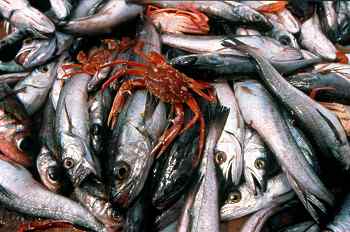 |
|
Hake is one of the most important commercially exploited species of the Benguela current |
|
|
Purse seining is the method used for catching small pelagic fish, which are either canned or turned into fishmeal |
|
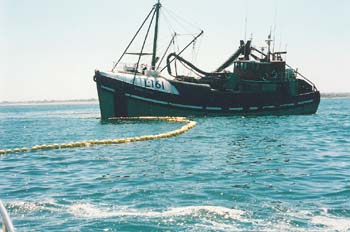 |
|
The importance of fisheries for Namibia
After 1990 fisheries developed into one of the most important economic sectors of the newly independent country and today contributes - with total landings of 578 000 mt in 1999 - more than ten percent to the gross national product of Namibia. The fisheries sector produces 30% of the value of all exports and thus comes in second place after mining. Correspondingly, fisheries generates an important part of the country's foreign exchange earnings. The sector has also played an outstanding role in the creation of employment. |
The Exclusive Economic Zone of Namibia
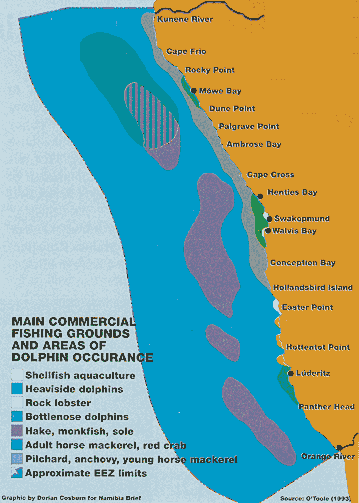
Source: Namibia Brief No. 18/1994
Bilateral Co-operation
Since independence the Namibian government has strived towards utilizing fish stocks on an economically and ecologically sustainable basis. After the declaration of the 200 nautical miles Exclusive Economic Zone and the establishment of the Ministry of Fisheries and Marine Resources one of the main tasks which needed to be assumed was the development of an efficient fisheries administration and the development of national capacities for marine ecosystem research and environmental monitoring. From 1992 onwards Namibia was assisted in this endeavour by the German government within the framework of technical co-operation. |
The first measures supported by GTZ were directed at strengthening fisheries administration and implementing new fisheries legislation. Starting in 1993 GTZ also contributed to a further project called MARENPRO (Marine Environmental Monitoring Project) which specifically aimed at
- solving an environmental conflict between the marine diamond industry and fisheries, particularly the lobster fishery
- introducing the concept of co-management of marine resources
- establishing a satellite supported environmental monitoring system for the Benguela current within the EEZ.
|
 Workshop with participants from the Ministry |
Fisheries Capacity Building Project
| The two independent projects were merged into the FishCapB (Fisheries Capacity Building) project in 1998, the implementation of which was entrusted to a consortium made up of two German consulting firms, GOPA and COFAD. The objective of FishCapB is to enable the Ministry of Fisheries and Marine Resources to develop and implement the framework conditions for an economically meaningful and ecologically adapted utilization of the fisheries resources by: |
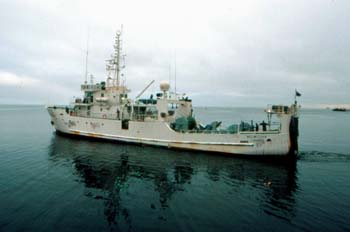
Since 1994 the modern research vessel Welwitchia is used to assess the fisheries resources within the Namibian EEZ and study the oceanographic conditions in the Namibian section of the Benguela current |
- developing and consolidating the capacity of the Ministry to formulate fisheries policies, carry out planning and undertake economic analysis
- institutionalising the co-operation between the Ministry and the fishing industry
- co-ordinating the training of Ministry personnel and carrying it out on a planned basis
- carrying out applied ecosystem research according to international standards
- utilizing the monitoring of the marine environment towards sustainable resource management
- identifying and evaluating the human influences on the marine coastal environment and initiating mitigating measures.
|
| The project focuses on the development of the legal framework for fisheries as well as the strengthening of a new Directorate entrusted with the elaboration of policies, planning and economic analysis. Furthermore, it continues to assist in further developing Namibia's marine environmental monitoring and integrating it with the system of the two neighbouring countries, Angola and South Africa. In order to facilitate the analysis of an increasing volume of marine environmental data, an oceanographic database (OceanBase) was adapted to the specific needs of Namibia and scientists trained in its utilization. In addition progress has been made in improving our understanding of the Benguela system and its influence on the development of fish stocks through basic research carried out in co-operation with the German Baltic Research Institute IOW and training Namibian researchers in accordance with international standards. Thanks to the IOW, German research vessels could also be deployed in the Benguela current region (RV Meteor, RV Poseidon as well as a vessel chartered from Russia, the RV Petr Kottzow). During the last research cruise of the RV Meteor, carried out in the four month period July to November 2000, investigations were undertaken on the diversity of benthos species in deep sea basins, plankton distribution as well as the dynamics of oceanographic processes in the Benguela system as a whole, but also specifically in the zone were the cold Benguela converges with the warm Angola current descending from the north which is an important spawning area for certain fish species. Some of the results achieved in the course of the research cruise have already been published in scientific journals. |
|
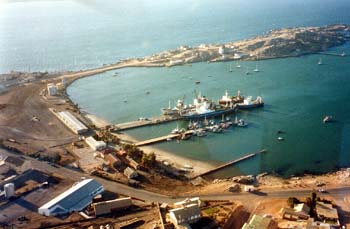 |
|
Lüderitz in the South of Namibia is the country's second most important landing point for fish and fish products (first is Walvis Bay) |
|
→ List of major studies produced under the project
The BENEFIT-Programme
Research and sustainable utilization of large marine ecosystems such as the Benguela current are only possible through the co-operation of all coastal states concerned. Based on this consideration the MARENPRO initiated contacts with South Africa and Angola since 1996 and together with other donor countries began to elaborate proposals for a joint research programme. Since 1998 the resulting BENEFIT-Programme (Benguela Environment Fisheries Interaction and Training) is a project implemented by SADC and supported mainly by Norway and Germany. Germany specifically assists the marine environmental component of the programme by providing expertise and advice via the FishCapB project. The focus of the German contribution to the programme is on developing the co-operation between the research institutions of the three participating countries and developing their capacity for marine research and environmental monitoring. In this context the most important activities are:
- training of scientists in country and abroad
- co-financing of research projects
- providing equipment for an oceanographic research station in Namib, Angola, the northern most reach of the Benguela current.
The BENEFIT-Programme is planned to run for a period of ten years and is destined to be the core project of the upcoming BCLME-Programme (Benguela Current Large Marine Ecosystem) for which funding has been requested from the World Bank's Global Environment Facility (GEF). |
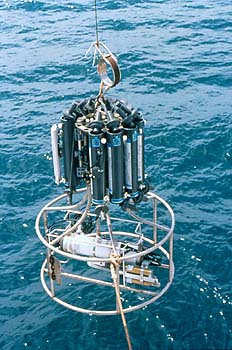
A multipurpose oceanographic probe is used from board of the research vessel to undertake measurements of different oceanographic factors at various depths. The data serves as a basis for fisheries management decisions |
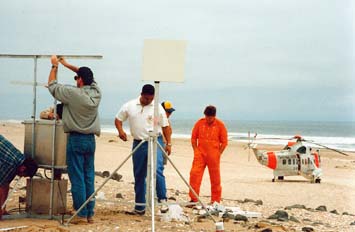 |
Automatic weather stations installed along the uninhabitable coast transmit meteorological data via satellite. This is to contribute towards our understanding of the various environmental mechanisms of the Benguela and thus predict their fishery biological implications |
|

